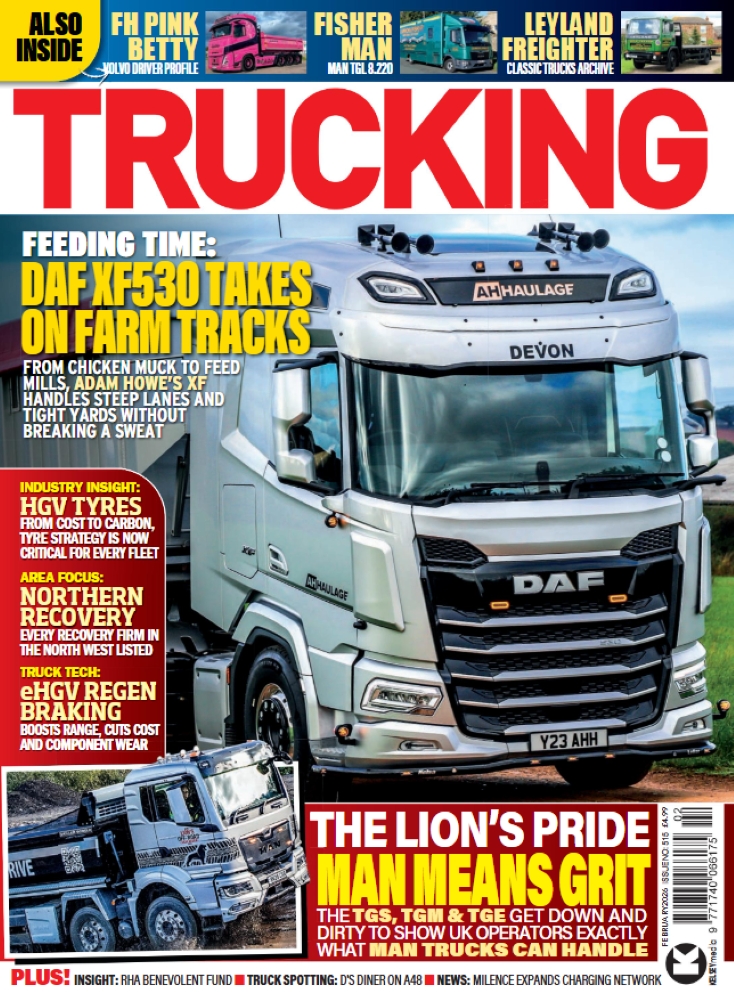The UK trucking industry moves over 71% of the nation’s freight, which already plays a vital logistics role. But what about future trucking trends? How will they shape how goods are transported in the UK and worldwide?
Several innovative advancements are already revolutionising the trucking industry, and we can expect to hear a lot more about autonomous trucks and automation technology in the future for example. These trends and others are paving the way for a more efficient future in logistics. But there are many more, such as:
- Electric vehicles: Offering reduced carbon emissions and lower operating costs.
- Data-driven logistics: Optimising the supply chain by leveraging data and predictive analytics for accurate forecasting and proactive decision-making.
- Advanced telematics: Enhancing fleet management by real-time monitoring drivers, vehicles, traffic, and the environment.
- Blockchain technology: Recording and verifying every transaction for complete transparency, real-time tracking, and reducing fraud.
Innovation in the trucking industry is helping to shape the future of global logistics, and companies that embrace these trends and identify new opportunities can create a brighter future.
Evolution of Technology in Trucking
Trucking technology has come a long way, especially in the last few years, yet it continues to evolve rapidly. This industry has already introduced significant improvements in efficiency and safety, such as the introduction of GPS and driver assistance systems. Still, there is much more to come, thanks to technological advances. Autonomous driving could become a game-changer for the trucking industry. Still, in the shorter term, the continued integration of advanced technologies using sensors and cameras powered by AI and machine learning algorithms will reduce labour costs, increase productivity, and provide substantial safety benefits. Real-time data analysis will continue to improve and become more powerful, enabling fleet managers to make better decisions based on more accurate and timely data. Electric vehicles and blockchain technology are also expected to play a more significant role. Electric trucks offer reduced emissions and contribute to a cleaner environment while saving on fuel. Blockchain technology can provide secure and transparent transactions, reducing fraud and improving accountability. Even though the evolution of technology in trucking has already transformed the industry with features such as the integration of Transportation Management Systems (TMS), the best is yet to come with even more exciting innovations that will continue to make the trucking industry safer, greener, and increasingly autonomous.
Automation and Autonomous Vehicles
Automation and autonomous vehicles can make transportation safer and more efficient. Incorporating automation in vehicles dramatically reduces the risk of accidents through human error. Drivers have quickly become used to collision detection, automatic emergency braking, and lane assist features. These technologies all use sensors and advanced algorithms to detect potential hazards and can take corrective actions automatically, preventing human error and significantly reducing reaction times. Automation also increases efficiency using adaptive cruise control and real-time data analysis to optimise fuel consumption and avoid traffic congestion. However, implementing this new autonomous technology comes with challenges, not least of which are the legal issues. Ensuring the safety of autonomous vehicles is crucial, but there are concerns about liability in the case of accidents. Other potential problems are that autonomous vehicles could mean job displacement in the trucking industry, necessitating the creation of new jobs and retraining programs. Autonomous vehicle technology already exists, but safety concerns and legal limitations persist. Further refinement and testing are necessary, as are new legal frameworks.
Data Analytics in Supply Chain Optimization
Data analytics can harness the raw power of data and transform it into something businesses can use to enhance their logistics and inventory management. Data analytics offers valuable insights, allowing businesses to make data-driven decisions using predictive analytics. Seeing patterns and predicting trends enables logistics operators to accurately forecast demand and optimise inventory levels, thereby improving efficiency. Real-time demand forecasting helps track shipments and identify potential supply chain risks. Improving inventory management is another area where data analytics is beneficial. By analysing historical data and customer behaviour, businesses can accurately forecast demand and track their inventory levels in real-time. Data analytics is necessary for shipping companies to optimise inventory management and identify potential process bottlenecks. Predicting customer demand is crucial for many businesses, and this is nearly only possible with any accuracy level with data analytics. Tools like data visualisation and machine learning are key for effective data analytics in supply chain optimisation, and embracing data analytics is crucial to stay competitive in today’s rapidly evolving marketplace.
Regulatory and Policy Considerations
The trucking industry is already subject to various regulatory and policy considerations influencing its operations. Critical considerations for future trends in regulation:
- Environmental Regulations: As consumer concerns about climate change and air pollution increase, trucking companies will likely face even stricter emissions standards, which may lead to adopting electric vehicles.
- Safety Regulations: Safety is a massive concern in the trucking industry, and the regulations regarding driving and technology usage will likely continue to evolve with advancements in safety technology.
- Autonomous Vehicles: The deployment of autonomous trucks will likely impact the trucking industry significantly, but the regulatory challenges have yet to be overcome. Future policy considerations will no doubt focus on autonomous technology.
- Infrastructure Investment: The condition and capacity of transportation infrastructure directly impact the efficiency and productivity of the trucking industry. Future policy could include increased investment in infrastructure to reduce congestion.
Regulatory compliance with the evolving legislation around vehicle technology and being proactive will be key to operating safely, successfully, and ethically.
Future Outlook and Challenges
The future of UK trucking looks exciting, with many possibilities and some challenges. Technological advancements have already revolutionised the industry and will continue to do so, improving safety, efficiency, and sustainability. Environmental consciousness has prompted the industry to adopt greener solutions and sustainable practices, but further innovation and disruption are necessary for UK trucking to remain competitive. As the future unfolds, UK trucking must navigate these challenges with an open mind and a commitment to change.
Nick Fryer has over a decade of experience in the logistics industry, spanning marketing, public relations, sales enablement, M&A and more at 3PLs and 4PLs, including AFN Logistics, GlobalTranz, and Sheer Logistics.






